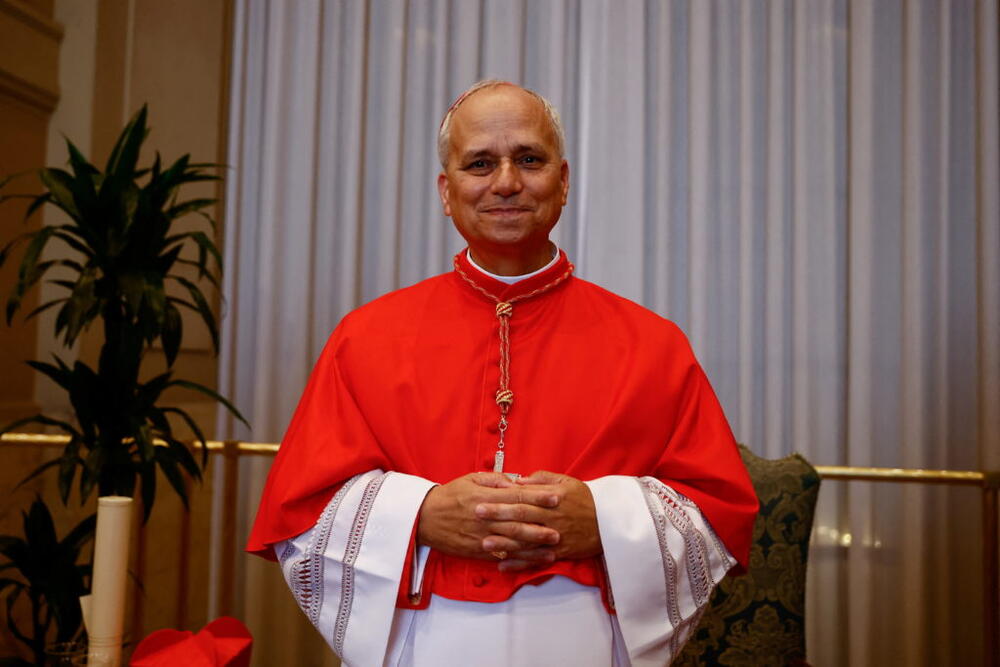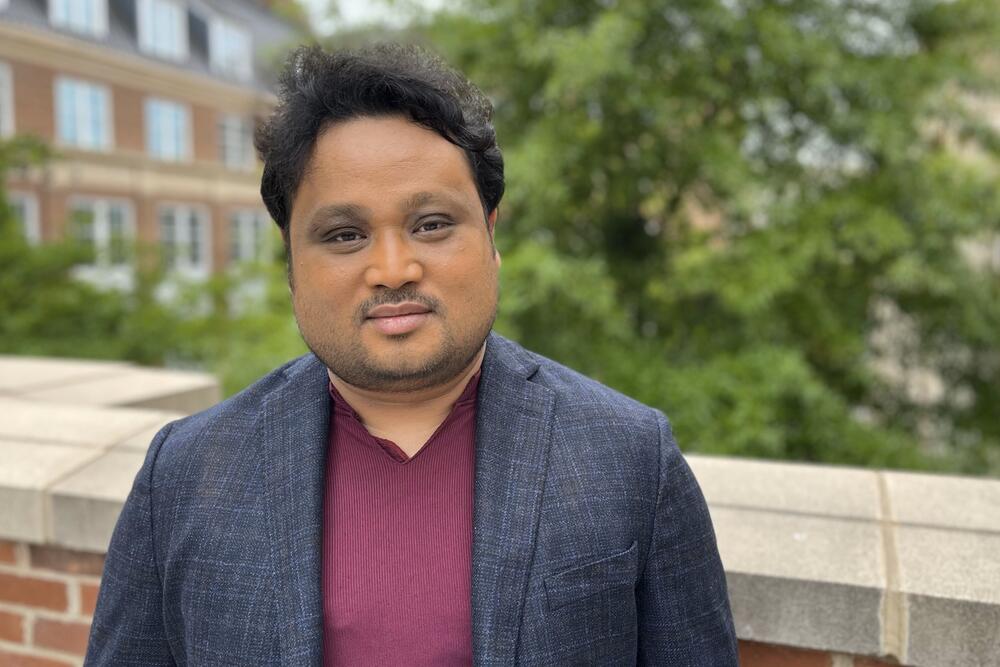
Section Branding
Header Content
Georgia Today: Kemp looks to upgrade 911 infrastructure; Health providers urge action on pollution
Primary Content
On the Thursday, May 8 edition: Gov. Brian Kemp looks to upgrade the infrastructure for the state's 911 emergency hotline; some Georgia health care providers urge state and federal governments to take action against pollution; and today's the birthday of jazz pioneer Mary Lou Williams.

Peter Biello: Welcome to the Georgia Today podcast. Here, we bring you the latest reports from the GPB newsroom. On today's episode, Gov. Brian Kemp looks to upgrade the infrastructure for the state's 911 emergency hotline. Some Georgia health care providers urge the government to take action against pollution. And today is the birthday of jazz pioneer Mary Lou Williams, who was born in the Atlanta neighborhood of Edgewood in 1910.
Jeff Crompton: She told this story of sitting on her mother's lap while mom was practicing. Her mother played organ at church in Edgewood.
Peter Biello: Today is Thursday, May 8. I'm Peter Biello, and this is Georgia Today.

Story 1:
Peter Biello: Georgia Catholics are reacting with excitement and hope to the election of Pope Leo XIV. Father Michael Bremer ministers at University of Georgia's Catholic Center. He, along with millions worldwide, watched Leo's first appearance.
Father Michael Bremer: So I don't speak Italian, but the word that I was picking up on during his initial announcement was pace, peace. So he was using that word a lot. So the hope is that he brings a little bit more peace into the world.
Peter Biello: He called it "surreal" that the church has its first American pope. Larry Witt, a member of St. Joseph's Catholic Church in Macon, was at the church to drape yellow and white bunting on its front doors in the color of the papal flag to show there's a new pope.
Larry Witt: Of course we'll all be happy, come Sunday with Mass and stuff, you know, and be talking about it and singing and just giving Him praise and thank God we got us a pope. But I'm extra glad that we got an American pope.
Peter Biello: Leo is a Chicago-born, now-former cardinal.
Story 2:
Peter Biello: Gov. Brian Kemp signed into law today a bill that paves the way for a multi-million dollar upgrade to the state's aging 911 infrastructure. Georgia is the only state in the Southeast that hasn't yet overhauled its emergency communications from an analog to an internet-based system. Kemp says House Bill 423 provides critical new technology.
Brian Kemp: Once complete, this system will improve both response times and the impact of our first responders. And that means safer, healthier communities literally in every corner of our state.
Peter Biello: Kemp also signed into law five other bills addressing public safety at a ceremony in Middle Georgia's Monroe County.
Story 3:
Peter Biello: Southeast Georgia congressman Buddy Carter announced his bid for U.S. Senate today, becoming the first GOP candidate to enter the race against Democratic incumbent Jon Ossoff. GPB's Benjamin Payne reports.
Benjamin Payne: The 67-year-old Republican and pharmacist has represented Georgia's 1st Congressional District since 2015. The district includes a largely rural swath of Southeast Georgia that he's easily carried in past elections, but it also includes Savannah's Chatham County, which voted against him last year. Carter's campaign announced his Senate bid in a video Thursday featuring clips from President Donald Trump's campaign rally in the Hostess City last September.
[Unidentified]: Trump has a warrior in Buddy Carter.
Donald Trump: Buddy Carter, warrior. Great guy.
Benjamin Payne: In response to Carter's bid, Democratic Sen. Jon Ossoff's campaign released a statement saying the 38-year-old incumbent is building what it called, quote, "the most effective and unstoppable turnout effort in Georgia's history." For GPB News, I'm Benjamin Payne in Savannah.

Story 4:
Peter Biello: Some Georgia health care providers are urging the state and federal government to get serious about pollution. They say dirty air puts people at risk, and without interventions, health outcomes will worsen. GPB's Sofi Gratas has more.
Sofi Gratas: Higher rates of asthma, heart attacks and reproductive issues have all been linked to pollution, according to leading health agencies. Georgia clinicians for climate action and others say that's a public health crisis. At a recent health care conference, the coalition warned that failing air quality grades are leading to sick patients. Pediatrician Michael Greenwald says the latest fight is public opposition to a plan from Georgia Power to keep its two coal-fired power plants in North and Middle Georgia online years longer than expected because of rising energy needs.
Michael Greenwald: But if our priority is our health, then we need to transform ourselves into an economy that actually sustains us with our health in mind as well.
Sofi Gratas: Georgia's Public Service Commission is holding a public comment hearing on the plan in Atlanta later this month. For GPB News, I'm Sofi Gratas.
Story 5:
Peter Biello: Research shows teens are more likely to turn to their parents when they need support rather than peers or professionals. That's according to a national campaign making resources available to families needing help, GPB's Ellen Eldridge reports.
Ellen Eldridge: During adolescence, parents can be quick to offer suggestions and advice, but judgment-free listening is the way to start a conversation. That's according to Charmaine Jackman, a psychologist with the Ad Council. She says parents must stay in communication with their kids and watch for changes.
Charmaine Jackman: Changes in mood, changes in their eating habits, changes in friendships, isolating more, spending more time away from family and away from their friends, losing interest in activities that they previously were really excited to be part of. Those are some really important markers for parents to notice.
Ellen Eldridge: Jackman says their Sound It Out Together resources include conversation starters and guides on listening to help children learn to work through their own problems. For GPB News, I'm Ellen Eldridge.
Story 6:
Peter Biello: Georgia Power says construction is underway on battery energy storage systems at four locations across the state. The move is expected to add more electrical generating capacity to help meet a growing demand for power, primarily by large industrial customers. Two of the systems will be located near existing solar facilities at Robbins Air Force Base in Houston County and Moody Air Force Base in Valdosta's Lowndes County. The two others will be at the retired coal-burning Plant Hammond in Northwest Georgia's Floyd County and at a battery facility in metro Atlanta's Cherokee County. Battery storage is seen as critical to diversifying the state's energy mix to include more renewable power.
Story 7:
Peter Biello: The Trump administration has canceled a $19 million infrastructure grant awarded to the South Georgia city of Thomasville by the outgoing Biden administration. City officials today confirmed they received notice last week that the Environmental Protection Agency was terminating its community change grant. The award promised to replace an outdated wastewater collection system, renovate a school gym, build a health care clinic, and provide home improvement grants. It was among the more than 100 grants touted by the Biden administration in December as advancing environmental and climate justice goals.
Story 8:
Peter Biello: And today is the birthday of groundbreaking jazz composer, Mary Lou Williams. Born in 1910, she spent her first four years in Atlanta's Edgewood neighborhood before her family moved to Pittsburgh. She became one of the most influential jazz pianists of the last century, shaping both the big band and bebop sounds with collaborators including Duke Ellington and Charlie Parker. Atlanta jazz musician Jeff Crompton was instrumental in getting a historical marker recognizing her birthplace dedicated last weekend.
Jeff Crompton: The first time she touched a keyboard was in Edgewood. She told this story of sitting on her mother's lap while mom was practicing. Her mother played organ at Beulah Baptist Church in Edgewood.
Peter Biello: Crompton worked for years to uncover details about Williams' childhood and says it's important for Atlanta to honor the jazz legend born there. And here's a bit of her music. This is the Mary Lou Williams Trio with "Eighth Avenue Express (Take 1)" from the album Roll'em.
MUSIC: Mary Lou Williams Trio - "Eighth Avenue Express (Take 1)"

Story 9:
Peter Biello: In his new collection of short stories, Aruni Kashyap comes back time and again to the tension between individual desires and society's limits. Whether writing about an academic struggling against the cultural expectations of his peers or residents of his native Assam, clashing with separatist insurgents or young gay men expressing their love in India when such romance was outlawed, Kashyap writes with insight and compassion. The book is called, "The Way You Want to Be Loved". Recently I went to the University of Georgia in Athens where Kashyap directs the creative writing program to speak with him about his book. Aruni Kashyap, thank you so much for speaking with me.
Aruni Kashyap: Thank you so much for coming down to Athens here. It's a pleasure to have you in my office.
Peter Biello: I wanted to ask you about academic life. Because you studied in Minnesota, as some of these characters do, I was wondering how much overlap there is between your experience and the experience of the characters in this book.
Aruni Kashyap: I think there's a lot of overlap, and even though I am actually from an academic family — my mother was a professor of Cotton College State University, which is one of the oldest universities in northeast India — I'm not at all new to academia. But at the same time, in a post-colonial country, actually languages also have different kinds of privileges, so being in English academia and Hindi academia or Assamese academia, Bengali academia, is very much different than each other. So when I actually entered academia, in the English academia, it has certain privilege of class and caste associated with it. So I was always an outsider in the academic space. These experiences actually enables me, this marginal position, enables me to actually point out to various blind spots that we liberals, we progressive people have.
Peter Biello: When you were studying in the United States in Minnesota, did you have a roommate like Mike? Mike appears in a couple of short stories in this book. He's — he's a white guy who's kind of insufferable. He's not as culturally sensitive as he could be, to put it mildly. And he made the characters in your stories really uncomfortable and in some ways wielded his power — perhaps without even knowing he was wielding his power, but doing it rather insensitively. Did you have a roommate like Mike or did you know someone like Mike?
Aruni Kashyap: I knew many people like Mike. Mike is obviously an amalgamation of many, many Mikes I knew as a student in Minnesota. I did have a roommate who was sort of strange and was not very sensitive towards the world, let's say. But I wanted Mike to be so much more exaggerated than the real Mike, because again, for dramatic effect. And I think that combining the many different characteristics of these Mike-like people enabled me to comment on how actually differences are perceived and accepted and negotiated in a society that is not comfortable with immigrants, not comfortable with difference. And I wanted to again write about someone like Mike who actually does a lot of these things without being completely — they don't have the self-awareness that they are actually saying these things that are offensive.
Peter Biello: I wanted to ask you about the political violence in these stories. There are some stories that depict just absolute brutality, and I was wondering how you went about writing about those things and what well of knowledge you were drawing on there.
Aruni Kashyap: A lot of these brutalities I grew up reading [about]. I actually didn't know they were unusual. I was born in 1984. The violent insurgency against Indian rule started in Assam in 1979. So by 1984, the insurgency was at its peak. As a result of that, I did not know a state or Assam that was without violence. The violence still continues. I like to tell this story because I realized how important this was much, much later. The story goes like this. Every day, my mother made it a habit to see me once and look at me for a few seconds before I hopped into the school bus. And I thought, you know, this is Mother being Mother. She actually loves her son so much. And she did that to both me and my brother. But much later, when I grew up, I asked her "Why you used to do that?" She said, "There was so much violence in Assam, that I was preparing myself if this was the last time I'm going to see you." And that changed everything for me because that means that every parent, every mother, every grandmother, every loved one lived like that, actually in Assam or in Kashmir or many other places where anti-India, independentist movements still are going on or have experienced those in the last few years.
Peter Biello: You write a few stories here about what it's like to be gay in India. I think there is a story where it is illegal and then a story when it's not illegal but it's a little bit scandalous to have a homosexual relationship. Can you talk a little about what it was like writing those stories?
Aruni Kashyap: You know, I lived in Delhi for the longest time. I had a very robust queer community. I was bothered by a lot of the stories that I was hearing and I wanted to write about how the person and the state and the individual is constantly in clash and writing about the anti-homosexuality laws, which is Article 377 that was, I think, scrapped in 2019 or 2018. I can't remember the date right now.
Peter Biello: I think it was 2018.
Aruni Kashyap: Yes, right. Thank you. September, I think it was. It was scrapped then. Until then, people were — that law was used to vilify [and] torture a lot of people I knew. A lot of the people had to suffer heartbreaking consequences, as you see in the story. The story actually, I wrote "The Way You Want to be Loved" is a gay romance story. The story, actually, I heard from a friend and it made me so angry. So I wanted to give it a different ending, because it was so heartbreaking for me to know that it's — just because two men were expressing love, and it was not obscene — they were holding hands — they had to go through that horrific experience. And it was just so common, and it is far more dangerous for trans people as well. So, that is the reason I wrote about it actually — was, in a way, for me to express my own outrage and sorrow and create a new — new ending for these two characters.
Peter Biello: Aruni Kashyap, thank you so much for speaking with me. I really do appreciate it.
Aruni Kashyap: Thank you so much. These are amazing questions. I really, really enjoyed answering them. Thank you for reading my work with so much care.
Peter Biello: Kashyap's book, The Way You Want to Be Loved, is the subject of the latest episode of Narrative Edge, GPB's podcast about books with Georgia connections. Orlando Montoya and I spoke about other aspects of his writing, including his use of folklore and the wicked stepmother trope to illuminate political conflict. Dive deep into a book and literary culture with Narrative Edge. Find it wherever you get your podcasts.
Peter Biello: And that's it for this podcast. Thank you very much for tuning in to Georgia Today. Remember to check our website GPB.org/news for any updates on these stories and news stories that our reporters are writing right now. If you haven't subscribed to this podcast yet, do it now. We will be back in your podcast feed tomorrow afternoon. And send us your feedback. The email address is GeorgiaToday@GPB.org. I'm Peter Biello. Thanks again for listening. We'll see you tomorrow.
---
For more on these stories and more, go to GPB.org/news


